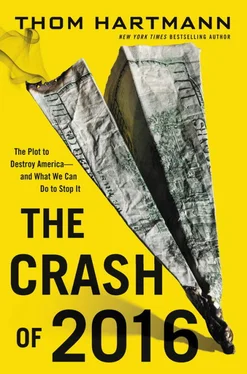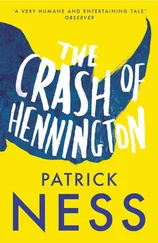While both de Tocqueville’s and Davis’s observations have to do with internal wars—revolutions—it’s easy to build a strong and historically grounded case for wars breaking out when a nation has Davis’s break from anticipated reality and then blames it on another nation-state.
In a more contemporary commentary, this logic was extended by Business Insider ’s Ricky Kreitner in an article whose title says it all: “Serious People Are Starting to Realize That We May Be Looking at World War III.”
Similarly, the New Republic ’s John Judis wrote in August 2011 that “in the U.S. and Europe, the downturn has already inspired unsavory, right-wing populist movements. It could also bring about trade wars and intense competition over natural resources, and the eventual breakdown of important institutions like European Union and the World Trade Organization. Even a shooting war is possible.”
War following a Great Crash that blew out people’s expectations of continued prosperity was unimaginable in the 1920s. Similarly, nobody seriously considered it in the early 1850s. And even Thomas Jefferson, in the late 1760s, was writing tracts about how American colonists could be “good citizens” of the United Kingdom.
But then came the divergence.
While America declines and Europe convulses, in China, huge cities are being constructed at breakneck speed, complete with brand-new high-rise condominiums, office buildings, and infrastructure such as roads and bridges.
Only, no one lives there. They are ghost cities. As 60 Minutes correspondent Leslie Stahl noted in March 2013, “We discovered that the most populated nation on earth is building houses, districts and cities with no one in them… desolate condos and vacant subdivisions uninhabited for miles and miles and miles and miles.”
The Chinese economy is growing at speeds not seen at any other time in world history. It’s estimated that as many as 200 million Chinese will undergo the urbanization process and move into the cities. That means more housing needs to be built, about ten million new units a year.
Build the cities and the people will come.
But construction is far outpacing projected demand.
As Forbes contributor Gordon Chang reported in March 2013, the Chinese put up 11 million new units in 2012, but in five years they will be building 19 million units every single year—far more than is needed to keep up with demand for housing.
What’s really happening in China is a housing bubble, even worse than the one that popped in the United States. And, like in the United States before it, the housing bubble is being driven in large part by a debt bubble.
This expectation of limitless demand is driving an enormous construction boom in China, which accounts for about half of the entire Chinese economy.
And expecting that property values will continue rising dramatically, the emerging Chinese upper and middle classes are investing everything they have, and leveraging their wealth with bank debt, buying up property in these ghost cities as investments for the future.
Chang explains, “The rich buy apartments and often leave them empty, treating them as a store of value. It’s not uncommon to find a single owner with as many as 20 vacant flats.”
But what happens if, under pressure from economies that buy from them, the Chinese economy slows down?
Chang writes, “When the underlying economy erodes—as it is showing signs of doing now—owners will dump units either to raise cash or to avoid taking even bigger losses. Most unsold apartments are in smaller urban areas, which is where a panic could start.”
The panic may already be under way. In 2012, unsold Chinese apartments increased by 40 percent, as measured by floor space.
China has done unprecedented things in its rise to becoming an economic powerhouse. But that doesn’t mean it’s immune from the dangers of Royalist capitalism.
Chang adds, “Analysts like to say China is different. Yet we hear a variation of this line just before every economic collapse. Beijing’s technocrats can postpone a reckoning, but they have not repealed the laws of economics. There will be a crash.” 167
And this crash could come sooner than projected.
Economist Richard Wolff argued in 2010 that the Chinese economy is secretly making a huge gamble on the global economy.
With exports making up nearly a third of the entire Chinese economy, a slowdown all around the world means big trouble for the Chinese domestic economy.
Yet in 2009 the Chinese economy grew by 8.7 percent, only slightly lower than in 2008, and then in 2010 it grew by more than 10 percent.
“How are they doing this?” Wolff asks. “How are they employing all of these people, keeping people out of the streets? They are an export economy, and the exports have dried up!”
Wolff explains what’s going on: “They are keeping everybody working. They are literally holding, stockpiling, warehousing unspeakable quantities of output in the hope that the world economy will correct itself soon enough that they can unload all that stuff.”
But they can’t do this indefinitely.
“This is the biggest gamble any country we know of has ever taken,” Wolff adds.
By 2012, it began to look like the gamble might not pay off. That year, the Chinese growth rate drastically slowed to 7.8 percent, its lowest rate in thirteen years.
With their consumer base drying up around the world, the internal problems in the Chinese economy will only worsen. By 2016, as the masses that moved in to the cities start losing their jobs, unrest will sweep the country.
The faster the domestic Chinese economy shrinks, the quicker the real estate bubble will burst, dragging upper-income Chinese citizens into the economic crisis, too.
Suddenly, the primary cheap-labor source the Western economies, in particular the United States, rely on will be wiped out.
Wolff warned what happens if the Chinese gamble doesn’t pay off: “The kind of economic downturn we had [in 2008] will look like a picnic.”
Those emerging markets that the Economic Royalists in Germany and the United States were betting will still be there after the Great Crash will, instead, be swept up into the global catastrophe.
Assuming the Eurozone holds it together, and assuming the technocrats in China are able to stave off the pitfalls of rapid economic growth, there’s still another potential shock lurking that can bring down the entire system: oil .
The entire world’s economy is lubricated by oil. We rely on oil for energy, to grow and transport food, for construction, for our military, and as a raw material for fertilizers, pesticides/herbicides, and pharmaceuticals, just to name a few.
So when the price of oil goes up, then the price of everything goes up, the economy grinds to a halt.
This happened in the United States during the oil shocks of the 1970s, when OPEC cut off oil exports to the United States in October 1974. The price of a barrel of oil doubled in one year, and a deep economic recession hit the nation that cracked open the door for the Economic Royalists.
Similarly, while the 2007–08 financial panic was certainly caused by bad behavior on Wall Street, it was preceded by another drastic spike in oil prices. Between 2004 and 2008, the price of oil climbed from the $40-a-barrel range to a peak of $147 a barrel in 2008.
Economist Jeremy Rifkin, author of the book The Third Industrial Revolution , argues that the root cause of the 2007–08 financial panic was the surge in oil prices. And ultimately, there will be several more shocks as the Industrial Revolution, which has been based on fossil fuels, reaches its inevitable conclusion—the point at which we run out of oil.
Читать дальше












